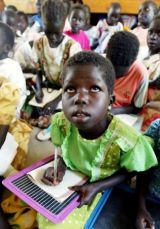South Sudan, Kenya discuss educational cooperation
Aug 8, 2006 (NAIROBI) — Senior government officials of Kenya and the southern Sudanese authorities began talks on Tuesday in Nairobl to seek ways to help the latter develop its educational system.

|
|
A Sudanese girl listens to her teacher as she attends a class along with over 150 other girls at Rumbek primary school in Southern Sudan April 19, 2004. |
The week-long bilateral discussions, which will culminate into the signing of an educational agreement, will involve capacity building in educational training and research through skills upgrading, quality assurance and institutional management.
In his opening remarks, Kenyan Education Minister Dr. Noah Wekesa said his country was ready to assist the southern Sudanese government in the reconstruction of the vast region.
“Following commitments made by Kenya to support the government of Southern Sudan in its reconstruction process, the ministry of education is more than ready to provide whatever support that may be appropriate to meet the needs of southern Sudanese,” Wekesa said.
“Already some preliminary discussions took place last year which culminated into the establishment of Kakuma Teachers Training College.” he added.
“We have surplus teachers who we expect will be sent to the southern Sudan to assist our brothers whom we have assisted in realizing peace. We don’t have a shortage of teachers but lack funds to employ more locally and what we need is to assist them to get jobs,” the minister said.
Wekesa said Kenya has a number of public and private universities that offer degrees and postgraduate teacher training, which he said would support the southern Sudanese by providing opportunities for university education.
The 16-member Sudanese delegation comprising three ministers and 13 senior officials arrived in Nairobi on Monday and is scheduled to visit the east African nation’s learning institutions.
The delegation led by Dr. Michael Milli, Education Minister of the south Sudanese government, is expected to ink a bilateral agreement to realize teacher importation.
Dr. Milli said the recruitment of Kenyan teachers in south Sudan was their key priority as the region was in dire need for teachers.
The minister said there was now peace in south Sudan and that the only challenge now was reconstruction.
“There is nothing to fear in southern Sudan. We have not forgotten the role Kenya played during the difficult struggle for peace in our region. We would not like to employ more teachers from Kenya to affect the teaching system in Kenya,” Dr. Milli stated.
“We are also planning to reach out to our neighbors in the Great Lakes region to see how the shortage of teachers can be minimized. Once the agreement is reached, we hope the teachers may start working in the next academic year which starts in April next year,” he said.
Analysts say that considering the return of thousands of displaced refugees in the next several months, the southern Sudan authorities, UN agencies, and non-government organizations are preparing for increasing enrollment of children in primary schools throughout the vast region of south Sudan.
More than 20 years of civil war, which ended in January 2005, destroyed most infrastructure in south Sudan. Aid workers said there were only 1,600 primary schools in the area, and less than 200 were in permanent structures.
It is estimated that only 20 percent of children attend primary school, among which only 35 percent are girls. Half of the teachers in south Sudan did not receive any professional training, while just seven percent of them had a year’s training. The teachers work for nothing, or for very little that the parents can pay.
(Xinhua/ST)
